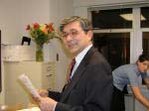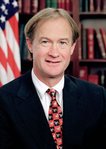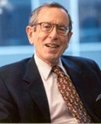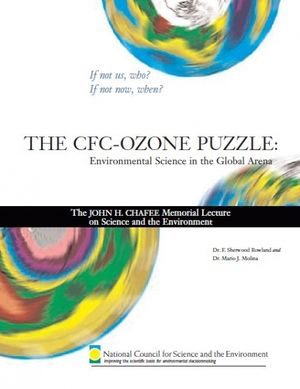CFC-Ozone Puzzle: Opening remarks
| Topics: |
Series: The John H. Chafee Memorial Lecture on Science and the Environment
1st National Conference on Science, Policy and the Environment
Date: December 7, 2000
Location: National Academy of Sciences, Washington, DC

Karim Ahmed: Good evening. On behalf of the National Council for Science and the Environment, I wish to welcome you to the inaugural John H. Chafee Memorial Lecture on Science and the Environment. My name is Karim Ahmed and I will begin by reading a statement from Senator John Warner who is unable to be here with us this evening, and who is the co-chair of the Host Committee of the John H. Chafee Memorial Lecture on Science and the Environment. Senator Warner’s statement reads as follows:
My dear friend, John Chafee, would have been proud and honored that you are recognizing his lifelong passion to protect and preserve our natural world through this annual lecture series on Science and the Environment.
From his earliest days when the Congress focused on our national responsibilities to improve air and water quality, to preserve wildlife habitat, to control ozone depleting chemicals, to his latest commitment to develop an international consensus on global climate change, John was a leader, not just a participant.
We know of his many policy accomplishments. Every major environmental statute reflects John’s dedication and heartfelt commitment to improving our quality of life. It was not only his political skill that led to this success but his grace and unfailing sense of purpose that won us over.
Let us continue in John’s footsteps, with his steadfast conviction to tackle the challenges ahead— and to do it, as he would say, “with good cheer.”
I commend the Council for this living tribute to John Chafee, and wish you every success.
With kind regards, I am, sincerely, John Warner.
I also received a similar letter from Senator Max Baucus, who also, as you know, was a close colleague of John Chafee in the US Congress and is co-chair of the Host Committee. His letter reads as follows:
Dear Friends: I had the privilege of serving in the Senate with John Chafee for more than 20 years, including serving with him for a decade in the leadership of the Senate Environment and Public Works Committee. He was a gifted legislator and a dear friend.
On environmental issues, he worked tirelessly to protect the environment. But his approach was never strident. Instead, he would listen, educate and seek common ground. In this way, he won many quiet victories that will benefit our nation and world for generations to come.
I appreciate this tribute to John and am pleased to be associated with it.
Sincerely, Max Baucus
As you know, Senator Baucus is the co-chair of our Host Committee tonight. In the folder distributed to you this evening, we have included a wonderful article entitled, “John Chafee: The Gentle Warrior.” It not only gives you an overview of his leadership and accomplishments in the United States Congress, but also portrays him as a remarkably committed, fair-minded and decent human being. This article, published earlier this year, was written by Steven Shimberg, someone who knew him very well, having served as his legal counsel on the Senate’s Committee on Environment and Public Works, and, most recently, as its Staff Director. Also, in this article – in a box – are remarks by one of Senator Chafee’s Congressional colleagues from the other side of the aisle, Senator Max Baucus whose statement I just read.
Now, I would like to introduce one of Senator Chafee’s former classmates from Yale University. Ambassador Charles Whitehouse, who, along with other members of the Yale class of 1944, is a member of the Host Committee for this evening’s event. Ambassador Whitehouse, who was a close personal friend of Senator Chafee, has had a very distinguished career in government service. Like Senator Chafee, he served in the U.S. Marine Corps during World War II, where he earned 21 air medals and seven distinguished flying crosses.
Over the years, he has held high-level appointments in both the Defense and State Departments. Ambassador Whitehouse was deputy ambassador in Vietnam in 1972 and later served as ambassador in Laos and Thailand during the middle seventies. Not only has Ambassador Whitehouse been repeatedly honored by the U.S. State Department for distinguished service to his country, he is a recipient of the French Legion of Honor. I now call upon Ambassador Charles Whitehouse to speak on behalf of Senator Chafee’s classmates, Yale class of 1944.

Ambassador Charles Whitehouse: Thank you for that very generous introduction. I feel a bit like a clergyman when they make the announcement in church and everybody in the church has in their pew a list of the announcements that he is making. All of you have a copy of the remarks that I am going to make. But I am not going to ask you to read in unison with me.
Almost all of us here today were friends of Senator John Chafee and some of us, notably Chuck Alling, Bill Goedecke, Tim Hoopes, Junie O’Brien, Eddie Welles and I were in his class at Yale and, therefore, first came to know him 60 years ago in the autumn of 1940. Not all of the persons whom I mentioned are here today, but the Allings are here, the O’Briens are here, and Eddie Welles is here and my wife and I are here.
I will not pretend that any of us foresaw what an extraordinary career in public life John was to have. Who could guess that he would serve twice as Governor of Rhode Island, become Secretary of the Navy, and be a Senator representing his state for 23 years?
What we did notice right away was that John was an extraordinarily decent and nice person and instantly became one of the most popular men in the class. As the years passed we also became aware of the fact that he had an unerring instinct for doing the right thing and for doing it well. All of us served in World War II, but John left Yale right after Pearl Harbor! He saw a lot of combat on Guadalcanal and in the other parts of the Pacific and then later as a Company Commander in Korea.
Becoming a warrior was the right thing to do at the time. Typically, when he came to the Senate he saw that becoming a champion of environmental causes was then the right thing to do.
We, who knew John for so long, salute you for organizing this lecture in memory of our dear friend and classmate. As we all know, he richly deserves a tribute of this kind.
Karim Ahmed: Thank you, Ambassador Whitehouse. I’d like to now call upon Mr. Edward Welles, who wishes to say a few words about a program he has been involved with at Yale University to honor Senator Chafee.

Edward O. Welles: First, I am pleased to be here in the company of many distinguished scientific individuals. I don’t fit into that category, but I do fit into the category of being a great friend and admirer of John Chafee. One thing that sticks with me through the years is that in the summer of our sophomore year at Yale, we drove a rattletrap old Ford to West Texas and worked in the oil fields for 60 cents an hour, but we did get a little overtime.
In any event, having said that, what I want to say about John is that we here tonight, I think, reflect a great character and more than that the great appreciation his classmates have for the work he has done for our country, for his state, for his family and for all of us. I do feel the Yale School of Forestry does have a great opportunity to march ahead with something significant for the environmental world in years to come. I think one of the mainstays of that program will be the scholarship program for graduate students who are pursuing their work at Yale. Thank you.
Karim Ahmed: As no one in the audience need be reminded, Lincoln Chafee was appointed by the governor of Rhode Island to fill the unexpired term of his father who passed away, as you all know, in October 1999. In his own right, Senator Lincoln Chafee ran for office in this year’s general election as a Republican, which was his father’s party. We’re happy to report that he won the Senatorial election by an overwhelming majority in a northeastern state where the vast majority of voters are registered Democrats.
Other members of the Chafee family are also present with us this evening. I now ask Senator Chafee to step up to the podium to introduce members of his family and to present his personal reflections on this inaugural John H. Chafee Memorial Lecture on Science and the Environment.

Senator Lincoln Chafee: Thank you very much. And yes, on behalf of the Chafee family, I do want to thank the Council for establishing this wonderful celebration of John Chafee’s environmental legacy. I also want to thank Dr. Sherwood Rowland and Dr. Mario Molina for presenting tonight’s inaugural lecture. My father relied on your scientific findings and counsel to craft some of our nation’s most significant environmental policies. As we all know, my father believed the stewardship of the environment is our sacred duty.
My sister, my wife, my sister’s husband and my brother are here tonight as is my mother. My mother was our family’s first environmentalist and she says that an early inspiration was Our Plundered Planet by Fairfield Osborn. Anybody here read it?
Tonight we’ll hear about an area where John Chafee made important strides. In 1986, he was the first in the Senate to sound the alarm about the dangers posed by CFCs and other common chemicals to our atmosphere. As Ambassador Benedick notes in his book on the subject, Ozone Diplomacy, John Chafee’s mission to alert the public to the hazards of disintegrating ozone helped pave the way for the ratification of the Montreal Protocol and further strengthening of laws to protect the ozone layer.
Now, this task will be shouldered by a new Congress and a new President. Whether Vice President Gore or Governor Bush occupies the White House, all of us in public office ought to make this charge one of our highest priorities. Within this area, the single greatest challenge we must address is the issue of climate change and my father thought that we could accomplish this mission in three ways: First, science must drive policy. I think we all agree that Congress must provide increased funding to support scientific research. Without this research, we on Capitol Hill will have a hard time making the case for climate change policy. Your organization can and will be an invaluable resource to us.
Second, we must walk the tightrope, balancing the need to safeguard our planet with the need to sustain the economy that powers it. Third, we must remain sensitive to the needs of developing countries that fear mandated cuts in emissions would stunt their efforts to attain the same level of prosperity that Americans enjoy.
And what we need most of all is great openness on the part of everyone involved in this debate. Throughout the twentieth century, efforts to preserve the environment have been challenged by people who fear that steps to control pollution would halt our prosperity. In fact, these fears were proven wrong each time. We need to have greater confidence today. By using our imaginations and venturing outside the narrower set of assumptions that constrain us, we can make progress. The divided composition of the House and Senate, and, indeed, the American electorate, demands that any progress on this issue be forged at the center.
And let us not forget the conundrum of climate change stretches far beyond domestic politics. We are all bound together as inhabitants of one fragile planet, and I am confident that together as inhabitants of this one earth, we will find wise solutions to our environmental challenges. And I know that my father would be honored to have this lecture series named for him.
Karim Ahmed: Thank you, Senator Chafee. Finally, the last act I will perform tonight is to ask Ambassador Richard Benedick, President of the National Council for Science and the Environment, to replace me at the podium in order to introduce the main speakers for tonight’s event. Ambassador Benedick was responsible in the US State Department for population affairs and subsequently for environmental issues. In this capacity, he was the chief US negotiator and principal architect of the historic Montreal Protocol that Senator Chafee just mentioned, which protected the stratospheric ozone layer, that he has described in his classic book, Ozone Diplomacy. He is currently a Deputy Director at Battelle Institute in Washington, DC and is a Visiting Fellow at the German Social Science Research Center in Berlin. Ambassador Benedick has served since 1994 as the President of the National Council for Science and the Environment.

Ambassador Richard E. Benedick: Thank you very much, Karim, ladies and gentlemen, Senator Lincoln Chafee, distinguished guests.
For me, it is a personal privilege and pleasure to be able to participate this evening in honoring a great statesman, a champion for science and the environment, and, at the same time, to be introducing not just one but two eminent scientists—Nobel Laureates—who will be the first presenters of this annual John H. Chafee Memorial Lecture. I must say after hearing Senator Chafee, the current Senator Chafee, I have renewed faith in the power and potential of our Congress. I hope that they can live up to the sincere wishes and the very well founded sentiments that Senator Chafee last mentioned. I also thank him for the plug for my book, Ozone Diplomacy. Very kind of you.
The work of our lecturers tonight, in effect, exemplifies the principles that Senator Chafee stood for, namely, the need for innovative and brilliant science to support rational environmental decision making. As the current Senator Chafee said, science must drive public policy. Not just that, policy makers must exemplify the courage that Senator John Chafee showed so often in his career.
In 1974, the now historic landmark article by Dr. Sherwood Rowland and Dr. Mario Marino was published in a British scientific journal, theorizing that CFCs had the potential— and it was only a theory at that time—to destroy the fragile ozone layer thirty miles above where we’re sitting today, a layer of unstable molecules that protects all life on earth from the effects of potentially fatal ultraviolet radiation. We may have forgotten how this article shook the scientific and industrial communities to their foundations. And it may be emblematic that while my book is called Ozone Diplomacy, the first book on that subject recording those events was called The Ozone War.
And Dr. Sherwood Rowland and Dr. Mario Molina were right in the middle of that war. It took the same kind of courage that on so many occasions Senator John Chafee also demonstrated in the Senate, to come through that and eventually, of course, to be recognized for their great achievements by the Nobel Prize committee. I’ve had the personal good fortune, in the course of my own professional career, to be associated with all three of these remarkable individuals.
When Secretary of State George Schultz asked me to lead our nation’s efforts internationally to save the ozone layer, I learned from Dr. Rowland and from Dr. Molina the scientific underpinning for our negotiating position that eventually led to the historic Montreal Protocol in 1987. An outcome, by the way, that was by no means assured given the very strong opposition at that time from most other nations in the world and from most of industry, and even at home. During these tough international negotiations, it was Senator John Chafee whose courage, wisdom and vision mobilized Congressional support that was essential to overcoming very determined domestic political opposition to a strong international treaty.
It is therefore indeed fitting that, at this first national conference of the National Council for Science and the Environment, these two giant figures in the modern history of science policy come together this evening. For their work also exemplifies the underlying vision of the National Council for Science and the Environment, with its unique mission of promoting science for environmental decision making and with its unique consortium of environmental stakeholders: universities, scientific associations, private industry, state and local governments and civil society—all of whom have been represented today and will be tomorrow at this wonderful conference.
So ladies and gentlemen, I have the honor to present to you the inaugural presenters of The John H. Chafee Memorial Lecture on Science and the Environment.
|
|
